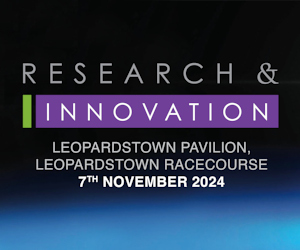Ensuring the Continued Success of the Bioeconomy in Ireland – Progressing & Translating Research

“The bioeconomy is a transition requiring a transition,” said Teagasc researcher Dr Maeve Henchion, co-organiser of ‘Ensuring the Continued Success of the Bioeconomy in Ireland: Progressing & Translating Research’, a Teagasc-hosted event held in Dublin recently. She said: “It requires new support frameworks and policies, and new ways of conducting research to ensure it achieves impact.”
George Burke, Department of the Taoiseach presented key messages from the recently government-approved National Policy. In addition to seeing the bioeconomy as supporting a move to a low-carbon economy, its potential to support employment growth and regional development, promote energy security and also contribute to improved productivity of crops, animals and microbes is acknowledged. “The bioeconomy presents significant opportunities to our agriculture, forestry, aquaculture, bio-processing, biotechnology and pharmaceutical industries, but we need to narrow this down and focus on opportunities that leverage Ireland’s unique sources of competitive advantage. That is the reason for this National Policy Statement which sets out a vision, common principles and strategic objectives for the future development of the bio-economy, ” said George Burke.
Professor Kevin O’Connor, UCD, outlined how the SFI-funded BEACON centre will link science, technology, business and society to develop the Irish bioeconomy. He said; “While I am a scientist, I know that science and technology alone will not deliver the bioeconomy for Ireland. We need to integrate science, business, policy and society, and in doing so we need to make sure that the bioeconomy delivers for biomass producers, e.g. farmers, and the fishing community.”
The changing research ecosystem and the need to constantly evaluate research impact was a theme addressed by Teagasc Director, Professor Gerry Boyle. “The bioeconomy calls for radical innovation, not just involving new technologies and policies, but also new ways of doing things. A change in how research is done is one of the changes required. As a science-based organization we need to be constantly focused on the end user – be that the farmer, consumer, food processor or indeed policy maker – and to consider how we need to adapt to deliver for them.”
Rhonda Smith, coordinator of CommBeBiz, launched the CommBeBiz blueprint which provides practical initiatives and recommendations for bioeconomy researchers. “The successful delivery of the ‘Big idea’ that is the Bioeconomy needs an army of researchers with the skills and confidence to speak out to multiple audiences and engage with communities. Whilst researchers themselves can help themselves to an extent, the ‘ecosystem’ around them needs to embed skills training and implement reward mechanisms to deliver the research innovation that is not only expected but demanded by funders and society. The CommBeBiz project’s BeBizBlueprint, with its key messages and practical examples, aims to further the discussion, particularly in academic and funding sectors, as to how the infrastructure around the research community can ‘future proof’ bioeconomy innovation.”
Responsible Research and Innovation is an important concept for the Bioeconomy as highlighted by Dr. Áine Regan, Research Officer with Teagasc and partner in the CommBeBiz Project. “We need to ensure that the products, processes, and policies that are developed within the bioeconomy are aligned to the needs and values of society as a whole. To embed this approach in bioeconomy research will require researchers to assume new roles and responsibilities including communication and engagement with diverse audiences at different stages of the research process. Ensuring that researchers receive appropriate reward and recognition for these new roles is important. Current research evaluation structures (largely focused on journals, papers and patents) need to be critiqued to consider whether changes are necessary to support new roles and competencies for the bioeconomy researcher.”
This seminar builds on previous seminars in the Teagasc Bioeconomy Impact Series. “It’s great to see how research reported at our previous seminars has contributed to the development of the National Policy Statement. We look forward to continuing to support the government’s inter-departmental group, through our involvement in BEACON and other research programmes, to develop the bioeconomy and support the rural economy,” said Dr Maeve Henchion, CommBeBiz partner and Principal Research Officer in Teagasc.







